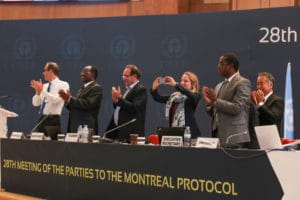Nearly 200 countries struck a landmark deal last weekend to reduce the emissions of powerful greenhouse gases (GHG) and hydrofluorocarbons (HFCs), in a move that could prevent up to 0.5°C of global warming by the end of this century, while continuing to protect the ozone layer. United for Efficiency (U4E) welcomes this historical agreement.
The amendment to the Montreal Protocol on Substances that Deplete the Ozone Layer, endorsed in Kigali last weekend, is the single largest contribution the world has made toward keeping the global temperature rise “well below” two degrees Celsius, a target agreed to at the Paris climate conference last year.
Used commonly in air conditioning, refrigeration and a host of industrial products as substitutes for ozone-depleting substances, HFCs are the world’s fastest growing GHGs, their emissions increasing by up to 10 percent each year.
With the implementation of the Kigali amendment, consumption of HFCs will be significantly reduced and frozen in 2024 in developed countries and in 2028 in developing countries.
Combining energy efficiency efforts with the use of natural refrigerants brings even greater benefits.
In the global room air-conditioning sector alone, improving the energy efficiency of equipment by 30 percent, while simultaneously transitioning to HFC alternatives, could save an amount of electricity equivalent to 2,500 medium-sized power plants. Additionally, it would provide climate mitigation of nearly 100 billion tonnes of carbon dioxide (CO2) by 2050, according to the Institute for Governance & Sustainable Development.
U4E supports such a combination of efficiency efforts and the phase down of HFCs.
Aligned with the Montreal Protocol and in anticipation of the Kigali amendment, U4E builds synergies among international stakeholders to encourage developing countries and emerging economies to create national and regional efficient and climate-friendly appliance strategies.
A key component of the U4E support is a series of policy guides, designed to help policymakers develop and promote energy-efficient and climate-friendly strategies in their national markets.
